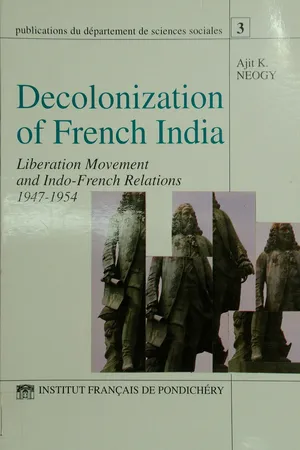
Decolonization of French India
Liberation movement and Indo-French relations 1947-1954
- English
- ePUB (mobile friendly)
- Available on iOS & Android
About this book
The central theme of the book has been woven round the five French settlements in India with Pondicherry as their headquarters which France intended to retain even after Britain had quitted on 15 August 1947. France had neglected her Indian settlements over the years and finding a profound change in the attitude of her people after 1947, she tried to mollify them by introducing certain doses of administrative reforms which were unacceptable to them. Inspired by the events of the neighbouring subcontinent, they expressed their desire to identify themselves with their brethren across the border and demanded the merger of the settlements with Indian Union which was, quite naturally, rejected by France. The rejection was followed by the launching of liberation movement. Repressive measures unleashed by Pondicherry government proved ineffective. Along with this there was a strong diplomatic pressure exerted by New Delhi on Paris for withdrawing from the five pockets. France dithered and delayed the solution which further exasperated the people. Events in North Africa and Indo-China were also going against her. The stalemate continued for seven years until Pierre Mendès France came to power. Meanwhile Chandemagore was transferred to India by referendum. However, diplomatic parleys started at the initiative of the French Prime Minister broke the thaw and facilitated the path for peaceful merger of the four south Indian settlements with India. Thanks to the diplomatic efforts and the spirit of conciliation manifested by the two governments, the problem of the French Indian settlements was amicably resolved thereby opening an era of cordiality between the two countries.
Frequently asked questions
- Essential is ideal for learners and professionals who enjoy exploring a wide range of subjects. Access the Essential Library with 800,000+ trusted titles and best-sellers across business, personal growth, and the humanities. Includes unlimited reading time and Standard Read Aloud voice.
- Complete: Perfect for advanced learners and researchers needing full, unrestricted access. Unlock 1.4M+ books across hundreds of subjects, including academic and specialized titles. The Complete Plan also includes advanced features like Premium Read Aloud and Research Assistant.
Please note we cannot support devices running on iOS 13 and Android 7 or earlier. Learn more about using the app.
Information
Table of contents
- Cover
- Bibliographic informations
- First pages
- Notes
- Table of contents
- Abbreviations
- Avant-propos
- Foreword
- Preface
- Introduction
- 1. French India in the Aftermath of World War II
- 2. French India in a Flux
- 3. Reforms and Reactions
- 4. Villes Libres: Municipal Reforms and Response
- 5. The French Proposal and the Acceptance of Nehru Plan
- 6. The June Declaration and the Municipal Elections
- 7. Revolt in Mahe and New Development in Chandernagore: Perspective of the Jaipur Resolution
- 8. Retaliation and Counter-Retaliation Indo-French Relations Plummeted
- 9. New Areas of Dispute
- 10. Pondicherry in the Hands of the Thugs: Referendum Deferred
- 11. Pro-Mergerists in Despair and Despondency
- 12. Critical Year of Indo-French Relations
- 13. A Barren Year: Stalemate Continued
- 14. Defection of the Socialist Leaders and the Liberation of the Communes
- 15. On Way to Paris Talk
- 16. Talks Resumed at New Delhi: France Departed
- Conclusion
- Appendices
- Appendix I. Déclaration conjointe du 28 août 1947
- Appendix II. Déclaration du Gouvernement du 8 juin 1948
- Appendix III. Prime Minister Nehru’s Letter to Ambassador Daniel Lévi on June Declaration
- Appendix IV. Ambassador Lévi’s Letter to Prime Minister Nehru
- Bibliography
- Index